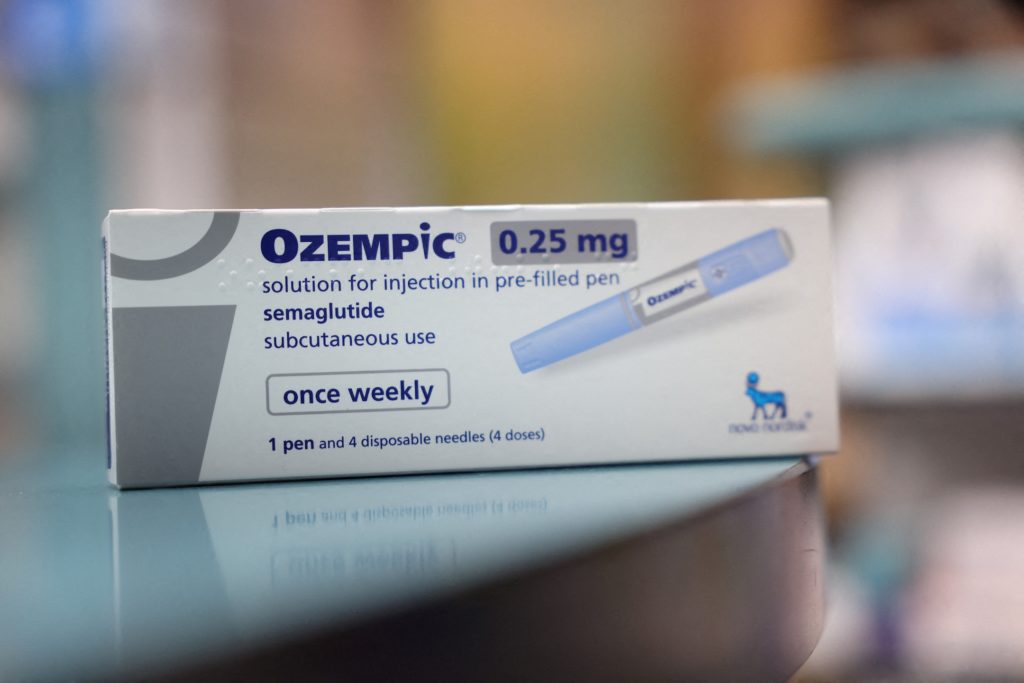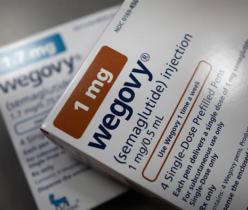Support Intelligent, In-Depth, Trustworthy Journalism.
Catherine Rampell Catherine Rampell
Diane Lincoln Estes Diane Lincoln Estes
Leave your feedback
Last year, Americans spent over $50 billion on weight loss drugs like Ozempic and Wegovy. Their popularity, and their price, are having effects throughout the economy. PBS News Hour special correspondent and Washington Post columnist Catherine Rampell reports.
Notice: Transcripts are machine and human generated and lightly edited for accuracy. They may contain errors.
Amna Nawaz:
Last year, Americans spent over $50 billion on weight loss drugs like Ozempic and Wegovy. Their popularity and their price are having effects throughout the economy.
“PBS NewsHour” special correspondent and Washington Post columnist Catherine Rampell has the story.
Taryn Mitchell, Uses Weight Loss Drug:
I would have come right here.
Catherine Rampell:
At the grocery store, Taryn Mitchell always made a beeline to the cookies.
Taryn Mitchell:
Biscoff would have gotten me every time.
Catherine Rampell:
Mitchell has long struggled with her weight.
Taryn Mitchell:
This says that a serving size is four cookies. I would not have been able to stop at four cookies. I’m like I would have had four cookies. And then the next hour, I would be hearing them call me. The noise would be so loud that I would have to eat all the cookies, because they just can’t be there. They miss me when they’re in the pantry.
(Laughter)
Taryn Mitchell:
They need me.
Catherine Rampell:
Her food noise was muted thanks to a new class of drugs called GLP-1s, such as Ozempic, Wegovy and Zepbound.
They were first made to treat diabetes. After being approved for weight loss, prescriptions have surged. About one in eight U.S. adults has now taken these meds. The name brand versions cost about $1,000 without insurance.
Taryn Mitchell:
It changes the way my brain responds to the hunger and it changes the way my brain tells me that I am hungry, right? So your stomach still rumbles a little bit, but it is not a voracious monster in there. This, “Feed me, Seymour,” it is not that.
Catherine Rampell:
She tried everything.
Taryn Mitchell:
I have tried fasting. I have tried so many different weight loss medications, two rounds of surgery. You name it, I have tried it.
Catherine Rampell:
Mitchell started Wegovy last summer. It’s transformed not only her shape, but her spending.
How much money do you think you’re saving on groceries?
Taryn Mitchell:
I would probably say I’m saving about $100 a month.
Catherine Rampell:
That’s not uncommon.
Leo Feler, Chief Economist, Numerator:
It’s about 20 percent decline in monthly spend on groceries for a one-person household. We see the biggest decline…
Catherine Rampell:
Leo Feler is chief economist at research firm numerator. He’s been following how GLP-1 meds are changing spending habits.
Leo Feler:
Categories We see the greatest increases in consumption.
Catherine Rampell:
He tracks receipts for about 18,000 households who volunteer that at least one member has taken these drugs.
Leo Feler:
A little bit over half are using them for diabetes. And that means a little bit under half are using them for weight loss.
Catherine Rampell:
For those taking the drugs to lose weight:
Leo Feler:
You see bigger declines in things like chips and things like candy and things like ice cream, sugary sodas.
Catherine Rampell:
As online pharmacies make versions of these drugs more widely available, snack food makers have begun worrying about their bottom lines.
Walmart’s U.S. CEO said that shoppers on GLP-1s are buying less food. Hershey’s Michele Buck told CNBC her firm is watching the situation.
Michele Buck, Chair and CEO, Hershey: We are closely monitoring it, but we believe we can adapt.
Catherine Rampell:
In fact, Nestle just announced a new line of foods intended for GLP-1 users.
There’s also evidence that these meds may decrease other addictive behaviors like drinking, smoking and drug use.
Leo Feler:
On spirits consumption outside of the holidays, we saw an effect and we saw a little bit of an effect on wine and beer.
Catherine Rampell:
Mitchell buys less wine than Jack Daniels.
When was the last time you saw the Gentleman Jack?
Taryn Mitchell:
Christmas.
Catherine Rampell:
Oh, wow. Whereas, in the before times?
Taryn Mitchell:
Oh, he and I were very well acquainted.
(Laughter)
Catherine Rampell:
OK.
Mitchell’s obesity is now in remission.
You started this journey not out of vanity, not because you were unhappy with how you looked. You did it for health reasons, correct?
Taryn Mitchell:
Absolutely. I don’t want to be sick. And both my parents had dementia and Alzheimer’s. I think there are seven women in my family that have been stricken with breast cancer.
These are things that have a causal link to obesity. We don’t know, of course, what is actually causing them, but the link is there.
Dr. Jessica Bartfield, Atrium Health Wake Forest Baptist Weight Management Center:
There are over 200 diseases that have been connected to obesity.
Catherine Rampell:
Jessica Bartfield, an obesity medicine specialist, is Mitchell’s doctor.
Dr. Jessica Bartfield:
Things like type 2 diabetes, high blood pressure, cardiovascular disease, strokes, osteoarthritis, neoplasms or cancers.
Catherine Rampell:
Mitchell says her overall health has improved. She no longer has diabetes, for example.
Taryn Mitchell:
I’m on Wegovy for the rest of my life, but I can show you an entire medicine Cabinet full of medications that I no longer have to take.
Catherine Rampell:
Feler was so struck by his data that he himself recently began using a GLP-1 and has lost 25 pounds of COVID weight.
Leo Feler:
There is a long-term health benefit, right? My 70-year-old self-is going to be thanking me. If people are healthier, they might live longer lives. They might have less morbidity later on in their lives.
Catherine Rampell:
The drugs are pricey. Some patients may have to take them for the rest of their lives. And we don’t yet know all of the long-term effects.
Right now, they don’t pay for themselves in reduced health care spending, but someday they might if insurers and payers get a discount.
Michael Dickstein, NYU Stern School of Business: We have measured the additional costs that come from having these prescription drugs against the savings you get from reduced cardiovascular outcomes and things like that. Right now, it looks like, at something like a 50 percent discount on the cost of the drugs, you would actually be saving the health care system money as a result of these treatments.
Catherine Rampell:
Health economist Michael Dickstein says the drugs might have effects on the labor force too.
Michael Dickstein:
There’s an effect on your productivity at work, the years in which you work.
Catherine Rampell:
That’s certainly been true for Mitchell.
Taryn Mitchell:
I have more energy. I picked up a little summer job at the baseball field. Just I’m trying new things and I am enjoying it.
Catherine Rampell:
Could you have taken the summer job before you had lost all this weight?
Taryn Mitchell:
No. I would just be too tired, to be quite honest.
Catherine Rampell:
All this affects government spending, too, on things like Social Security and Medicare.
But it can cut both ways.
Michael Dickstein:
You might have additional years working. That’s something to compute. You also have additional years of life after you retire, which means the pensions are going to have to pay out for a longer period.
Catherine Rampell:
The drugs alone could leave Medicare spending to skyrocket, especially as they get approved for more health issues.
Michael Dickstein:
Eli Lilly’s drug is under investigation for sleep apnea. Wegovy itself is under investigation for Alzheimer’s disease. So, at the point at which that gets approved, assuming it does, that’s going to be another fraction of the population within Medicare that would be eligible.
Catherine Rampell:
So we’re talking billions of dollars more in spending per year just on Medicare.
Michael Dickstein:
That’s right.
Catherine Rampell:
Given the high up-front costs, U.S. states and private insurers are struggling with weather to cover them.
Michael Dickstein:
Individuals switch employers quite often. In the U.S., that means sometimes you switch your insurance provider. It doesn’t always make sense for them to pay for this treatment today, because the cost savings might go to a different insurer or to the Medicare program.
Catherine Rampell:
Bartfield sees it here in North Carolina. The state employee health plan recently stopped covering GLP-1 drugs for weight loss due to cost.
Dr. Jessica Bartfield:
This can be a barrier. And it can be frustrating, particularly when you think that that is the best treatment for a patient.
Catherine Rampell:
Another barrier, overflowing demand for the drugs has meant that patients like Mitchell have faced shortages.
Taryn Mitchell:
I didn’t start the medication when it was first prescribed because I couldn’t find it at any pharmacy. We did horseback riding on the beach.
Catherine Rampell:
Even if Mitchell’s cutting back on groceries, she has found herself spending money on other activities, like horseback riding with her daughters.
Taryn Mitchell:
It was amazing, to be quite honest. I would have never thought to go horseback riding on the beach.
Catherine Rampell:
Because?
Taryn Mitchell:
You’re over 200 pounds, you don’t want to hurt the horse. I know that doesn’t sound logical, but these are the things that you think.
I would take the girls horseback riding, and I would watch them, because I always want my children to have these experiences. But I never thought that I would be part of the experience.
And this is the coolest.
Taryn Mitchell:
Something you can’t put a price on.
For the “PBS NewsHour,” I’m Catherine Rampell in Greensboro, North Carolina.
Watch the Full Episode
Dec 28
By Amanda Seitz, Associated Press
Nov 08
By JoNel Aleccia, Associated Press
Mar 07
By Michelle Chapman, Associated Press
Nov 10
By Rebecca Robbins, STAT
Catherine Rampell Catherine Rampell
Diane Lincoln Estes Diane Lincoln Estes
Diane Lincoln Estes is a producer at PBS NewsHour, where she works on economics stories for Making Sen$e.
Support Provided By: Learn more
Support PBS News:
Subscribe to Here’s the Deal, our politics newsletter for analysis you won’t find anywhere else.
Thank you. Please check your inbox to confirm.
© 1996 – 2024 NewsHour Productions LLC. All Rights Reserved.
Sections
About
Stay Connected
Subscribe to Here’s the Deal with Lisa Desjardins
Thank you. Please check your inbox to confirm.
Learn more about Friends of the News Hour.
Support for News Hour Provided By


